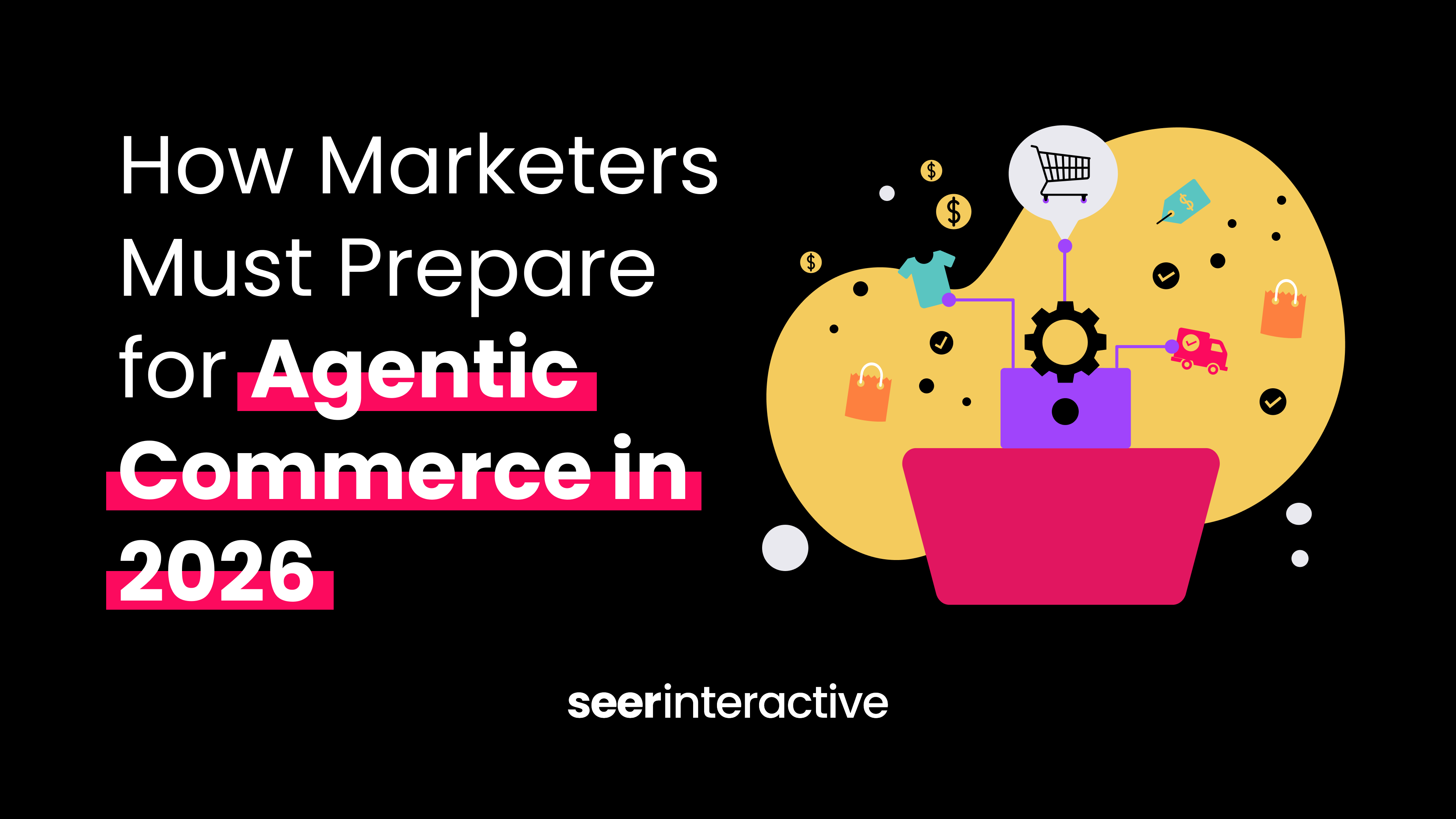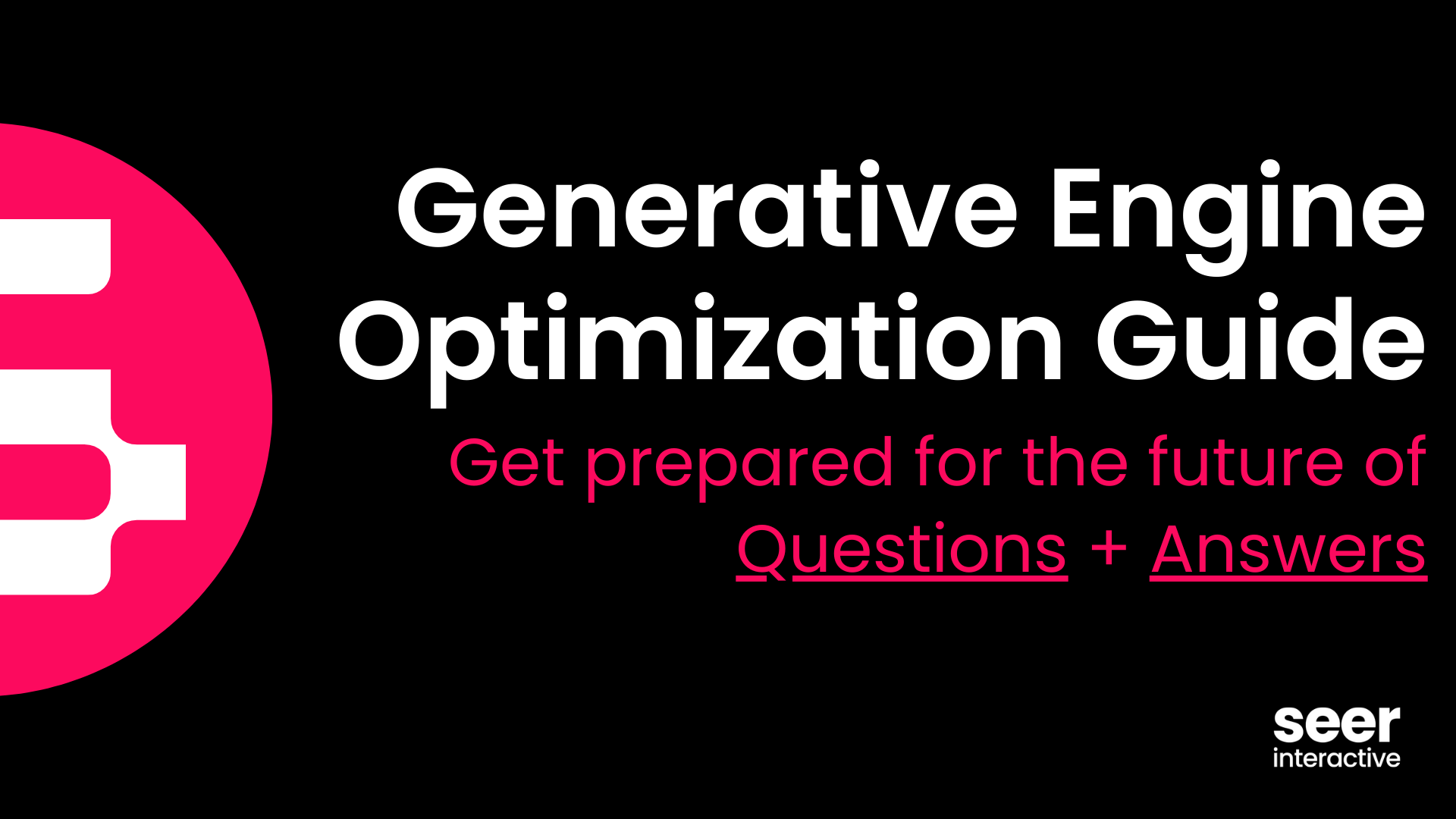Search Engine Journal recently published a summary and analysis of a fascinating conversation between Jason Barnard and Fabrice Canel that caught our attention at Seer. Barnard is the CEO of Kalicube and Canel is the Principal Product Manager at Bing.
The topic of the conversation was “How does Generative AI in Search Work and What is Coming in 2024” and the full video can be found here. At Seer, we have been bullish on the impact of Generative AI on digital marketing, but we hadn’t much discussed the concept of performing SEO within AI search engines much. This led to some intriguing questions:
- Can websites be optimized for AI search engines?
- If yes, then how?
- Should marketers invest in optimization efforts for AI search engines today?
This started a great internal conversation at Seer, and led me down a few rabbit holes in trying out different experiences via AI search engines. It felt a bit like my early days of search, before I had access to all of the data points that support the most core point of analysis in SEO: what is ranking and why?
I am both excited and reluctant to enter into this conversation today. Excited, because it is a truly interesting new element of the discipline of SEO. Reluctant, because I am right back in 2010, scratching my head wondering what is signal and what is noise. We aren’t currently collecting data at scale to interpret, so we have no tips and tricks to share. But, we can confidently share some of the conversations happening within Seer walls today. Hopefully they spark great conversations for you and your teams as well.
First, let’s start with the basics.
What are AI search engines?
AI search engines answer users’ queries by delivering text created via Generative AI. This differs from traditional search engines’ method of crawling, indexing, and serving relevant results to users based on their query.
While there’s much less emphasis on ten blue links, there is still an opportunity to push users towards relevant websites via citations.
A few of the most popular AI search engines include Bing Chat, Google Bard, and Perplexity AI.
Meanwhile, the major players in this field are also maintaining their traditional search engines. While they are undoubtedly making huge investments in these new technologies, it’s safe to say their core products are their traditional search engines.
In this post, we won’t dig into the role of Search Generative Experience, which is a hybrid between the two types of engines.
Can websites be optimized for AI search engines?
The more I think about this question, the more I think about the “milking the cat” joke from Meet the Parents. In theory, yes, anything can be optimized. But practically speaking, are we sure?


Based on my initial review and past experience with these engines, I’m confident that the answer is yes. Content can be optimized to be present in AI search engines’ citations.
I searched the same queries across both Google organic search, Perplexity AI search, Bing organic search, and Bing Chat. Here is what I found:
|
Query |
Overlap of Perplexity Citation Results with Top 10 Google Organic Results |
Overlap of Bing Chat Citations with Top 10 Bing Organic Results |
|
Should I get a wood or composite deck |
100% |
80% |
|
Best motorcycle helmet for women |
100% |
80% |
|
How do you know if you have termites |
100% |
100% |
|
What to write in a sympathy card |
100% |
40% |
|
How do I become a librarian |
100% |
40% |
|
Best over ear headphones under $100 |
100% |
20% |
|
Best coffee maker with auto start and large carafe |
83% |
40% |
My general findings and takeaways:
- Perplexity citations aligned very closely with Google’s top organic results.
- Quora was often a top result in Google’s organic results but not present in Perplexity’s citations.
- Bing Chat aligned more closely with Bing organic results than Google organic results.
- Bing Chat’s citations differed from Bing organic results more widely when the query was more transactional.
- Bing Chat’s citations often aligned closely with Bing organic’s “People also ask” link carousel.
- For top funnel queries, the experience is largely the same
- Featured snippets in traditional search engines are replaced by more in depth generative AI responses in AI search, but largely the experience feels similar.
- The ability to have a conversation within the same context window is neat, but for all intents and purposes that’s also achieved with the People Also Ask results present in both traditional search engines.
- For mid funnel queries, the experience is vastly different.
- Traditional search engines serve you an overwhelming display of options when it catches wind you may want to buy something.
- When Search Generative Experience is activated on Google search, it’s almost comically overwhelming.
- Perplexity was the clear outlier from Bing Chat and traditional search engines in their interpretation of how to fulfill user intent (see image 1, image 2).
- Optimizing content to be present within generative AI text responses seems possible, which is worth considering for branded queries.
Both Perplexity and Bing Chat seemed to have no problem pulling data straight from the source. This is interesting, as early indications from Search Generative Experience seemed to favor third party sources (see image 3, image 4)
 Image 1
Image 1
 Image 2
Image 2
 Image 3
Image 3

Should my marketing team invest resources in optimizing for AI search engines?
Yes, but optimization efforts for AI search engines shouldn’t look very different from your optimization efforts for traditional search engines. Some nuance applies based on both my findings, and that conversation with Fabrice Canel that I will reference here.
- Standard SEO Guidance Applies:
Overall, it appears that citations found in AI search engines are aligned with the same basic elements correlated with sites ranking in traditional search engines: authoritative, content rich, accessible websites are favored. There are nuances to ranking factors here that can be further explored - for example, what’s Perplexity’s beef with Quora? - but this will require further data. More on that below.
- Structured Data:
This seems to be one of the few things the entire SEO industry agrees on. The dataset I reviewed wasn’t large enough to draw conclusions from, but anecdotally I am seeing well structured and optimized content ranking well in AI search engines. Even with the decline of rich snippets in SERPs, structured data remains a good bet to invest in for greater SEO visibility.
- Crawlability & Indexability:
Ensuring your content can be crawled and indexed remains the single most important thing we can invest in to improve organic search search market share. Great content that can’t be fully crawled is not enough. Being able to rapidly publish timely content means much less if it can’t be quickly crawled and indexed. Canel cited IndexNow as an important resource for achieving this. More fundamentally, ensuring your site is technically accessible and responsive is key. If you need support with this, check out our offering here. - Content Strategy with Urgency:
The final point from Canel’s conversation that stood out to us was his thoughts on the delays large language models endure due to the time it takes to train. This isn’t a constantly refreshing database like traditional search engines (yet). One of the few knocks on OpenAI’s GPT is that the training model is quickly becoming outdated. Think about the billions that have been invested in current and future LLMs, just in the past few months. They are all actively training on available data. The content that you’re delaying publishing today may be too late to find itself in the next dataset.
- Invest in your Measurement Plan:
My overall take on what marketers need to do to prepare for a potential shift in their audience’s entry points is to establish a measurement plan today. This should include:
- Monitor how much traffic AI search engines are driving today. Share these numbers with your stakeholders and update them as the numbers shift. If you need help with this, check out this post.
- Evaluate how you can start to monitor your citations and brand mentions within AI search engines. Start conversations with your data providers to see how they are thinking about pursuing this. Check out this quick and dirty template to get started, and if you have a cleaner approach please share!
- Talk to your audience. Audience research is a very reliable leading indicator of how your priorities may need to shift. At Seer, some of our greatest findings for clients have come from moderated user testing. Learn more about how to achieve that here.
How much do AI search engines change the value of organic search as a channel?
One question posed in the chat between Canel and Barnard was: Are we officially leaving the era of ten blue links? I think most of us can agree that the train has already left the station. Personalization, localization, and the sophisticated use of logging added so much complexity beneath those blue links. AI search engines may look different, but the results at their core are very similar to what we’re already experiencing.
That said, the intent of the question is worth considering. With the amount of context wrapped around these new queries, how much more valuable is traffic sent from AI search engines vs traditional search engines? My take is until we see the contextual data surrounding these queries, that point is moot. In May 2023 we were told that we’d get Bing Chat data in Bing Webmaster tools. That offer now seems to be off the table.
Further, an obvious but important consideration is that vast majority of users are still using traditional search engines:
In August we learned that Bing’s search market share didn’t budge from ~3% despite the massive advancements present in Bing Chat.
Interest in Perplexity AI is on the rise, with a reported +37M visits in September 2023 (source).
Impressive, but less so when compared to Google’s +83B visits in the same month (source).
Even if traffic from AI search engines is 10x more valuable qualitatively, it still pales in comparison to the amount of opportunity present in traditional search engines.
If you’re doing any optimization testing within AI search engines and have similar (or differing!) data to share, please do so. You can find me on LinkedIn and X and I would love to continue this conversation.


